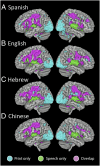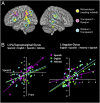Universal brain signature of proficient reading: Evidence from four contrasting languages
- PMID: 26621710
- PMCID: PMC4687557
- DOI: 10.1073/pnas.1509321112
Universal brain signature of proficient reading: Evidence from four contrasting languages
Abstract
We propose and test a theoretical perspective in which a universal hallmark of successful literacy acquisition is the convergence of the speech and orthographic processing systems onto a common network of neural structures, regardless of how spoken words are represented orthographically in a writing system. During functional MRI, skilled adult readers of four distinct and highly contrasting languages, Spanish, English, Hebrew, and Chinese, performed an identical semantic categorization task to spoken and written words. Results from three complementary analytic approaches demonstrate limited language variation, with speech-print convergence emerging as a common brain signature of reading proficiency across the wide spectrum of selected languages, whether their writing system is alphabetic or logographic, whether it is opaque or transparent, and regardless of the phonological and morphological structure it represents.
Keywords: cross-language invariance; functional MRI; word recognition.
Conflict of interest statement
The authors declare no conflict of interest.
Figures






References
-
- Seymour PHK, Aro M, Erskine JM. Foundation literacy acquisition in European orthographies. Br J Psychol. 2003;94(Pt 2):143–174. - PubMed
-
- Ziegler JC, Goswami U. Reading acquisition, developmental dyslexia, and skilled reading across languages: A psycholinguistic grain size theory. Psychol Bull. 2005;131(1):3–29. - PubMed
-
- Velan H, Frost R. Cambridge University versus Hebrew University: The impact of letter transposition on reading English and Hebrew. Psychon Bull Rev. 2007;14(5):913–918. - PubMed
-
- Frost R, Katz L, Bentin S. Strategies for visual word recognition and orthographical depth: A multilingual comparison. J Exp Psychol Hum Percept Perform. 1987;13(1):104–115. - PubMed
Publication types
MeSH terms
Grants and funding
LinkOut - more resources
Full Text Sources
Other Literature Sources

